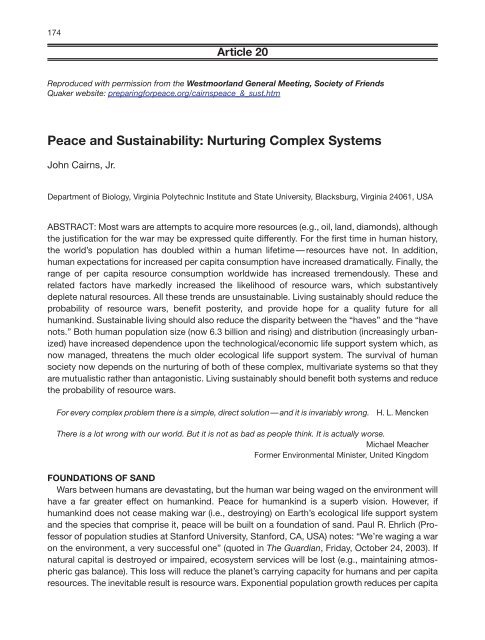174Article 20Reproduced with permission from the Westmoorland General Meeting, Society of FriendsQuaker website: preparingforpeace.org/cairnspeace_&_sust.htmPeace and Sustainability: Nurturing Complex SystemsJohn Cairns, Jr.Department of Biology, Virginia Polytechnic Institute and State University, Blacksburg, Virginia 24061, USAABSTRACT: Most wars are attempts to acquire more resources (e.g., oil, land, diamonds), althoughthe justification for the war may be expressed quite differently. For the first time in human history,the world’s population has doubled within a human lifetime — resources have not. In addition,human expectations for increased per capita consumption have increased dramatically. Finally, therange of per capita resource consumption worldwide has increased tremendously. These andrelated factors have markedly increased the likelihood of resource wars, which substantivelydeplete natural resources. All these trends are unsustainable. Living sustainably should reduce theprobability of resource wars, benefit posterity, and provide hope for a quality future for allhumankind. Sustainable living should also reduce the disparity between the “haves” and the “havenots.” Both human population size (now 6.3 billion and rising) and distribution (increasingly urbanized)have increased dependence upon the technological/economic life support system which, asnow managed, threatens the much older ecological life support system. The survival of humansociety now depends on the nurturing of both of these complex, multivariate systems so that theyare mutualistic rather than antagonistic. Living sustainably should benefit both systems and reducethe probability of resource wars.For every complex problem there is a simple, direct solution — and it is invariably wrong.H. L. MenckenThere is a lot wrong with our world. But it is not as bad as people think. It is actually worse.Michael MeacherFormer Environmental Minister, United KingdomFOUNDATIONS OF SANDWars between humans are devastating, but the human war being waged on the environment willhave a far greater effect on humankind. Peace for humankind is a superb vision. However, ifhumankind does not cease making war (i.e., destroying) on Earth’s ecological life support systemand the species that comprise it, peace will be built on a foundation of sand. Paul R. Ehrlich (Professorof population studies at Stanford University, Stanford, CA, USA) notes: “We’re waging a waron the environment, a very successful one” (quoted in The Guardian, Friday, October 24, 2003). Ifnatural capital is destroyed or impaired, ecosystem services will be lost (e.g., maintaining atmosphericgas balance). This loss will reduce the planet’s carrying capacity for humans and per capitaresources. The inevitable result is resource wars. Exponential population growth reduces per capita
Article 20175resources such as water, forests, croplands, etc. Another cause for concern is mass migration fromcountries that have exceeded their carrying capacity to countries where resources appear to bemore abundant.Individuals who believe that humankind is immune from natural law need only become informedabout the recent effects when Hurricane Isabel hit the 100+ miles of barrier islands (the “OuterBanks”) on the east coast of North Carolina, USA. The hurricane washed out much of the main roadfor the islands, destroyed motels and million dollar houses, and even divided one island into severalislets. A whole town, Hatteras Village, was cut off, temporarily at least, from the mainland.One persistent belief, especially in the United States, is that nature can be vanquished. At thecore of this belief is a conviction that there are no limits to growth. Proponents of unlimited growthconsider certain ideas subversive: that limits exist, that finite limits exist on a finite planet, and thathumans are subject to a finite carrying capacity (as with any other species). Peace is more than theabsence of war. The probability of peace will be dramatically increased if Earth’s life support systemsare nurtured and natural capital is not squandered, thus markedly reducing the likelihood ofresource wars. If humankind’s war on nature continues, humankind will suffer grievous harm.THE PIVOTAL ROLE OF PEACEPeace is an essential precondition for sustainable use of the planet. However, to be truly effective,the word peace must include the 30+ million other life forms with which humankind shares theplanet. The war on other life forms is transforming Earth at an exponential rate (e.g., McNeil 2000).This process is driven by rapid human population growth (e.g., Nelson 2003), corporate exploitationof natural resources, climate change, and an unjustified faith in technological solutions to ethicalproblems, such as the assertion by some economists that resources are infinitely substitutable.Humankind is waging resource war on natural systems by damaging habitat, which results in bioticimpoverishment, including species extinction well beyond evolutionary replacement of lost species.Old growth forests, coral reefs, wetlands, and other important ecosystem categories are atrisk worldwide. Waging war on the planet’s ecological life support system is suicidal. If the 21stcentury wars in Afghanistan and Iraq are harbingers of future conflicts, the “shock and awe” attackby a major military power will be followed by a sabotage and anarchy campaign by a significantnumber of indigenous people that may be aided by volunteers from other countries.In Iraq, occupying forces have cut down date trees, burned crops, drained wetlands, destroyed irrigationsystems, and burned grassy knolls in areas thought to be harboring terrorists (Al-Atraqchi2003, http://www.islamonline.net/English/In_Depth/Iraq_Aftermath/2003/10/article_13.shtml). Giventhe close association of local people with the land, reprisals appear inevitable.Collateral environmental damage caused by humankind’s life styles results in global climatewarming (e.g., Usha Lee McFarling, 24 October, 2003, Los Angeles Times), desertification, waterand air pollution, and changes in basic ecological cycles (e.g., nitrogen). Except possibly for a massivenuclear war, no war could be more devastating to natural systems.Sustainable use is closely linked to the health and integrity of Earth’s ecological life support system,which consists of natural capital (living systems) and the ecosystem services it provides. Thecondition of the ecological life support system depends, in turn, on a mutualistic, harmonious,coevolutionary relationship with humankind, its societies, and organizations. Above all, a positivecoevolutionary relationship between these two complex systems based on eco-ethics andsustainability ethics (Cairns 2003a) and a transdisciplinary synthesis merging environmental monitoringinformation across large temporal and spatial scales is essential. Effective use of environ-















